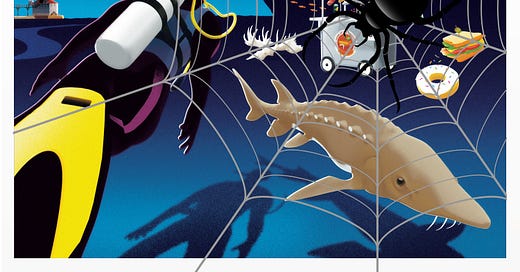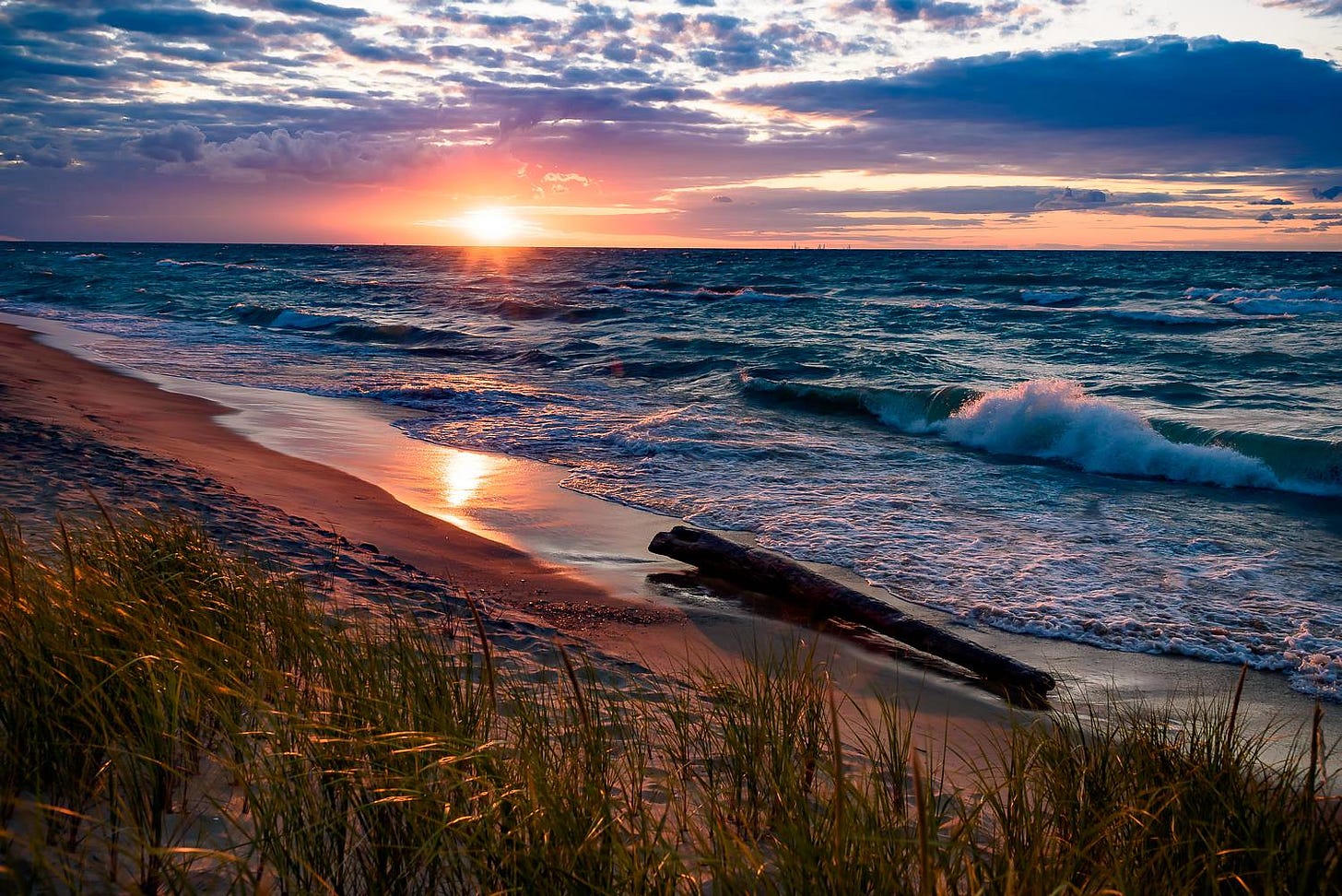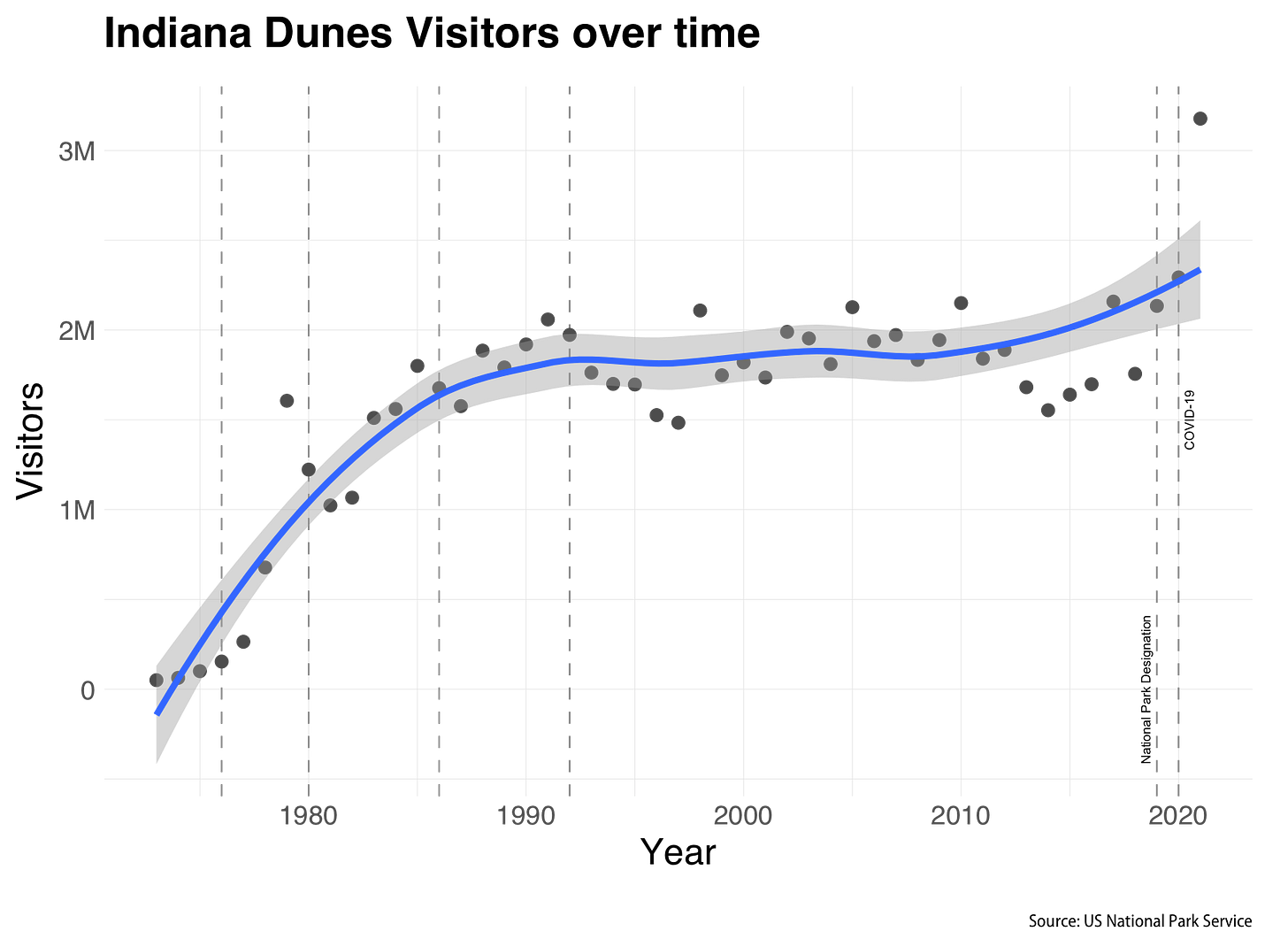Hi, and thanks for reading Teach Me About the Great Lakes: The Newsletter. I don’t know what this is going to be, exactly, but it’s something that I’ve been thinking about doing since the early days of the show, and when the delightful Lynne Heasley suggested starting a newsletter during our recording session* for Episode 65, I decided it was time.
*We often have really nice conversations with our guests before and after the actual interview…sometimes, we’ll post snippets in the post-credits section of the show (with permission!), sometimes not.
So, here we are. Teach Me About the Great Lakes: The Newsletter is a chance to try some different things. It will be intentionally slower, and hopefully more thoughtful, than social media, and I need something a little less twitchy in my life right now. It’ll also be a chance to try a new way to reach people. One thing we talk about a lot at Sea Grant is that we don’t know exactly what science communication will look like in 25 years (or, as I call it EXTENSION 2000, which the staff tells me maybe sounds a little dated), but we know that it won’t look like it looks today. So we need to be trying different things, some of which will stick, some of which won’t. Teach Me About the Great Lakes is one of those things…this newsletter is another.
But the overall idea of all of what we do is this: the Great Lakes are a social, ecological, and cultural treasure that we should be exploring and celebrating.
What will it look like? My plan is to have a brief essay or note up top, followed by some recurring sections…those sections will evolve over time as I try to figure out what works and what doesn’t. There will also be a few areas where I ask for your feedback on guest ideas, potential topics, etc. You can always reply to this email or leave a comment and I’ll read it. In fact, you can leave a comment right now by clicking this convenient button:
What we’ve been up to
The late fall and early winter is my favorite time of the TMATGL year because that’s when we run our three special episodes: the Lakehouse of Terror, the Season of Giving, and the Lakies*. If you’re unfamiliar with these episodes, they’re a fun way to end the year and, frankly, it’s nice to not have to plan topics during the busy end of semester.
*By the way: if you’re reading this before December 6th, it’s not too late to vote for the Lakies! Head to https://bit.ly/Lakies22 to nominate notable Great Lakes science, science communication, and sandwiches.
The Lakehouse of Terror is our annual Halloween special (the title is a thinly veiled reference to the annual “Treehouse of Horror” Halloween episode of The Simpsons) in which we write (well, loosely draft in my case) Great Lakes-themed scary stories and tell them. In last year’s episode, we told the stories around a “campfire” and things didn’t end so well. In this year’s episode, we went on a “sailing trip” and, well, things didn’t end so well. As usual Geneva Langeland of Michigan Sea Grant joined us, and she was definitely the MVP (again). Mizzenmast!

The Lakehouse of Terror is probably the most fun episode to record each year (well, except for the live episodes, which tend to involve beer); it’s self-indulgent, but we try to sneak some Great Lakes content in there, too.
After the goofiness of the Lakehouse of Terror, we have our make-good episode, the Season of Giving, where we feature nonprofits working around the Great Lakes. In this year’s episode, we featured two organizations: the Healing Our Waters Great Lakes Coalition, which helps communities and organizations leverage federal funding to work on projects to protect and restore the Great Lakes, and the Great Lakes Waterfront Trail/Waterfront Regeneration Trust, who maintain an Appalachian Trail-length biking trail along the Canadian Great Lakes coast.
Both of these nonprofits leverage very small staffs to have a Great Lakes-wide impact, which is always something that interests me. In fact, if you listen to the episode, you can hear the tension between me wanting to talk about process and Carolyn wanting to talk about results…as usual, she’s probably right, but I’m a White Guy With An Advanced Degree And An Administrative Position: I’m always happy to bull my way through 😅

Action item! Who should we feature next year? If you know of an amazing nonprofit in the Great Lakes, reply to this email or leave a comment on the substack website. We’d love to hear from you.
As for the Lakies, well, they’re the Lakies: quite possibly not the least-prestigious Great Lakes-themed award ceremony. I’ll have more on them in the next issue of this newsletter*.
*Have I mentioned that if you’re reading this in early December, it’s not too late to vote for the Lakies? You can vote for your favorite donut, too, at https://bit.ly/Lakies22.
What’s coming up
In addition to the Lakies, which we plan to release on December 19th, our December 5th episode will feature Chris Korleski, director of the EPA Great Lakes National Program Office. In an unusual move for us, we’ve already recorded this episode, so I happen to know that we’ll talk to him about the importance of the Great Lakes Water Quality Agreement, which was signed 50 years ago this year. I had no idea how important the Agreement is and I really appreciate Chris sharing his knowledge with us.

On December 12 at 11am Eastern we’ll have our second episode of Ask Dr. Fish, our live streaming show with Titus Seilheimer and Katie O’Reilly. I’ve started looking at the questions already…we’ll be talking fish tongues and sturgeon suction; it should be a good time. We’ll be streaming in partnership with Great Lakes Now, so head to their Facebook page or watch our social media for a link.
Linking out
This section (I need a cute name…let me know if you think of one) will feature a link to cool or enjoyable Great Lakes-related work. If you find an article/blog post/whatever that should be featured, send it to teachmeaboutthegreatlakes@gmail.com
This month, you should check out episode 20 of Lakes Chat, the podcast of the Alliance for the Great Lakes. In it, they discuss the recent Great Lakes Public Forum, in which the US and Canadian governments (led by EPA and Environment Canada) provide updates on the various efforts to protect and restore the Great Lakes. Joel Brammeier, the Alliance’s president and CEO, critiques the forum’s focus on success stories, and I think his perspective is valuable.
Help us find Great Lakes artists!
One of my goals with TMATGL is to feature Great Lakes culture in addition to Great Lakes science. We’d love to interview an artist whose work is inspired by the Great Lakes. If you know someone who fits that description, please let me know!
Great Lakes Factoid
I was doing some prep work for a presentation recently when I came across the visitation statistics for Indiana Dunes National Park. It turns out their visitation was way up in 2021…maybe because people had deferred trips during COVID, or because of increased demand now that it’s an Official National Park, or maybe because they changed their methodology…who knows? This is a factoid, not an inquisition! Anyway, here’s a graph:
Thanks for reading, and keep greating those lakes!





